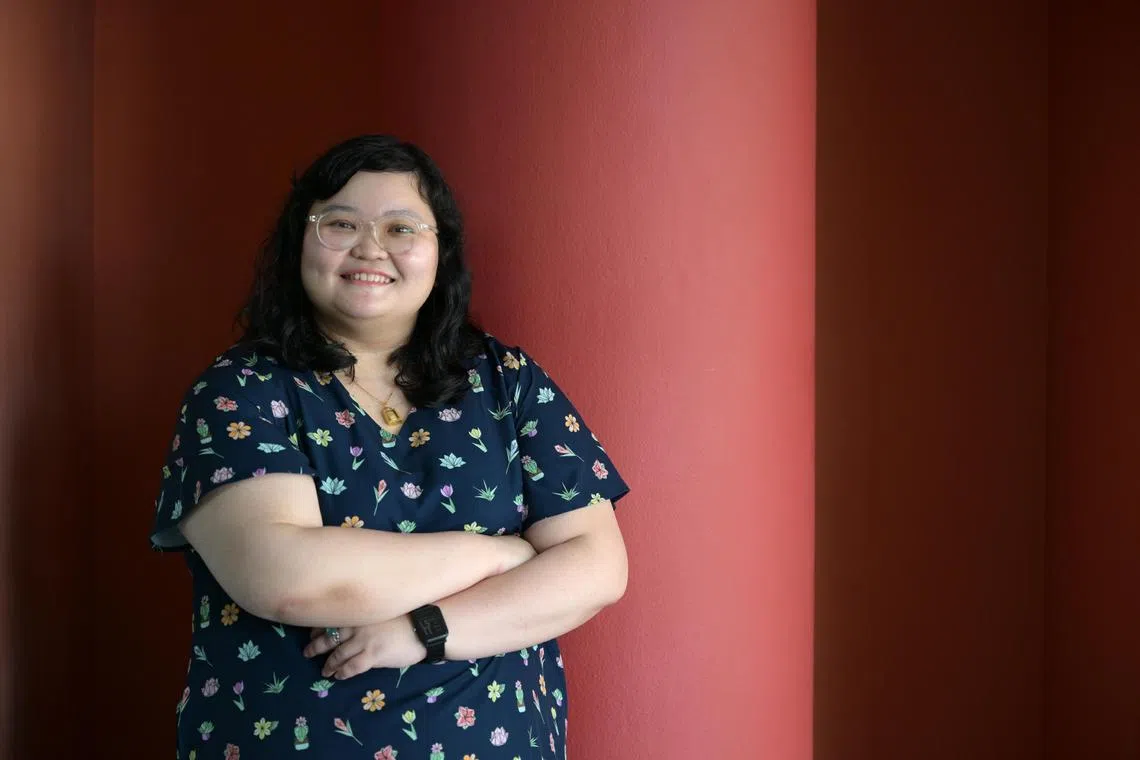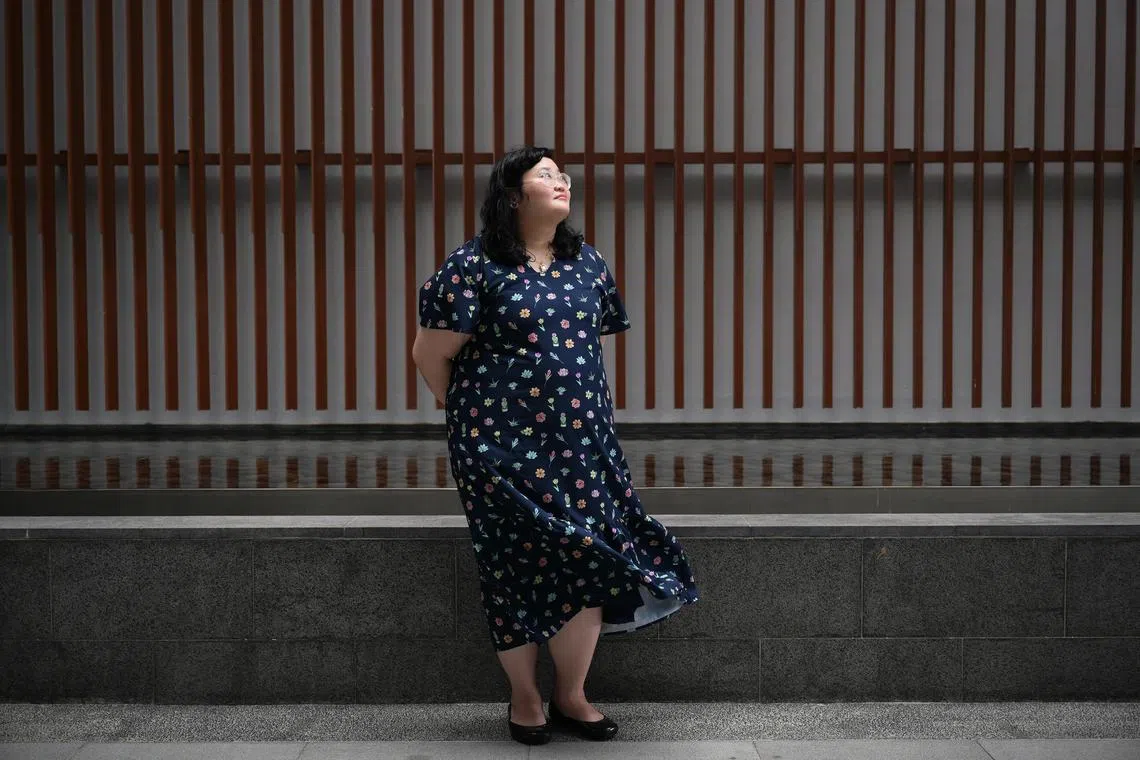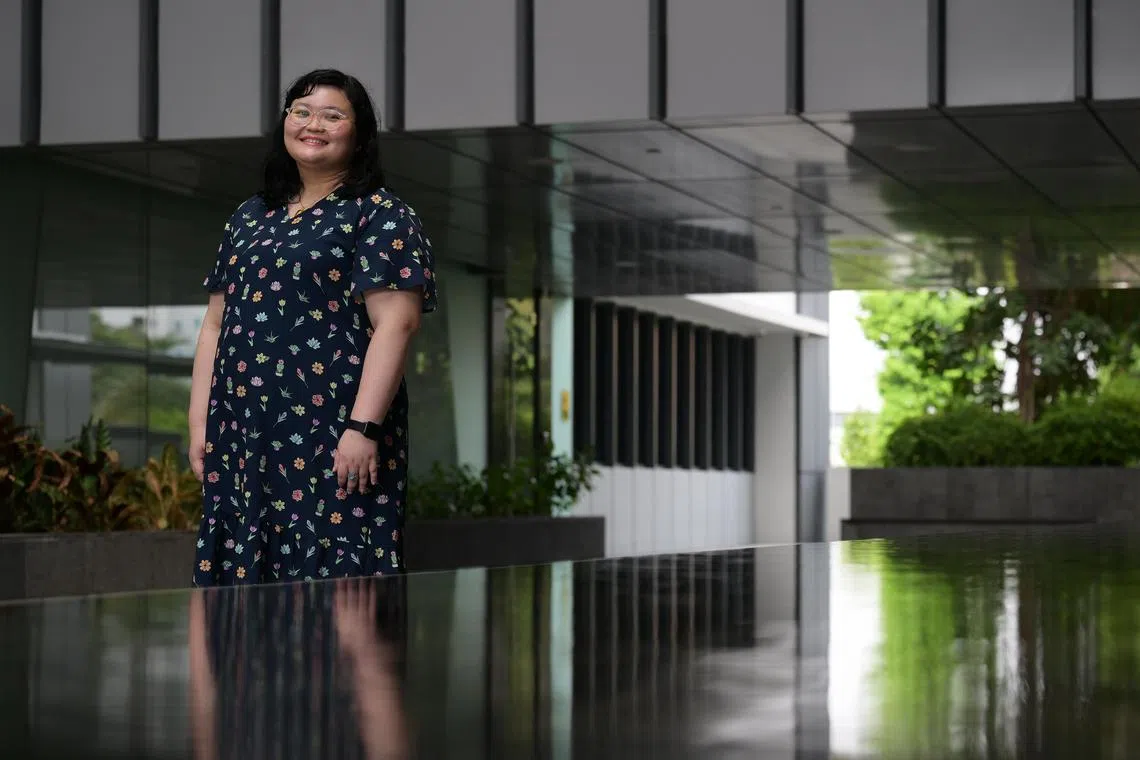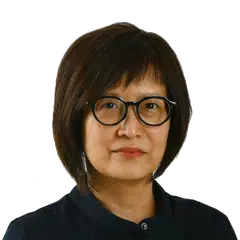No health without mental health
‘You’re a useless person’: Fighting the voices of schizophrenia in her head
Sign up now: Get tips on how to grow your career and money

At 17, Ms Wu Minyu was diagnosed with schizoaffective disorder. Now at 36, she is a peer support specialist at the Institute of Mental Health.
ST PHOTO: NG SOR LUAN
Follow topic:
SINGAPORE – When Ms Wu Minyu was 15, she, her mother and her brother moved into a new flat in a different estate. Not long afterwards, she felt that her neighbours were looking at her and making sarcastic comments.
“You’re a useless person,” she heard them say.
At school, she struggled with a new triple-science subject combination in Secondary 3 and could feel the academic stress piling up.
Her two good friends in school were now in a different class, and she felt that she did not fit in.
Deeply anxious, she would have sought comfort from her brother, whom she was very close to, but he had enlisted in national service. Only she and her mother lived at home, as her father had died when she was 10.
“I felt very unsafe; that someone was watching me and the person could predict my next move: ‘Look at her, she’s doing this, she’s doing that’,” said Ms Wu, who is now 36 and works as a peer support specialist at the Institute of Mental Health (IMH).
“It becomes very disruptive and it affects your mood, especially when you don’t know why this neighbour is hurting you so much.”
Ms Wu’s appetite and sleep were affected. She felt depressed.
When she was out, she said she looked so bad that people would stare at her.
“You’re able to tell when someone is not well... maybe the hair is not so neat, you look very dazed and my mother was holding on to me.”
Her family decided to seek help, and she was admitted to a general hospital for a few days and given antidepressants.
Ms Wu went back to school and did well enough to get into junior college, but the voices came back on and off, and the academic stress soon returned.
“That was when I felt I wasn’t well again.”
Not one but two conditions
At 17, Ms Wu was diagnosed with schizoaffective disorder, a mental health condition that has mood and psychosis components.
Those with the disorder experience symptoms of schizophrenia such as delusions, hallucinations, disorganised speech and cognitive impairment; together with symptoms of disordered mood such as depression or bipolar disorder.
The voices that Ms Wu heard were auditory hallucinations.
Schizophrenia is arguably the most feared psychotic condition. It is a severe, chronic mental illness that affects how a person thinks, feels and behaves.
Mathematician John Nash had the condition. His experiences were depicted in a 1998 unauthorised biography and in a 2001 Oscar-winning film, A Beautiful Mind.
Studies have shown that genetic predisposition accounts for up to 80 per cent of the risk of developing schizophrenia, while environmental factors such as stress, substance use and adverse childhood experiences also have an impact.
Globally, schizophrenia affects some 24 million people, and approximately 50 per cent of the people in mental hospitals have a schizophrenia diagnosis, according to the World Health Organisation.
In Singapore, schizophrenia affects about one in 116 people, with individuals typically finding out they have the illness in adolescence or early adulthood.
The condition is the most common disorder seen at IMH, which had about 1,800 inpatients a day on average in financial year 2023.
Patients with schizophrenia also account for the bulk of long-stayers at IMH, though a good number are there because they do not have family support.
Of the 800 long-stay patients in 2023, 495 had schizophrenia.
On her doctor’s advice, Ms Wu took time off from school to focus on her recovery. Her brother and mother were supportive.
In fact, when her brother entered university, he found work as a part-time tutor to support the family so that their mother did not have to work.
“He told my mum, ‘Just take care of Minyu. I will work’,” Ms Wu said.
Ms Wu completed her A-level programme after a year’s break, but could not find the motivation to study hard as the subjects did not appeal to her. As a result, she did not make it to university.
“My older brother encouraged me to go to a polytechnic to do a diploma. I felt like I was taking a step back as all my peers were moving on to different stages of life. At that time, if you were older than your peers, it was something that was not very good,” she said.
Still, she enrolled in a polytechnic, where she studied applied drama and psychology, which helped her learn more about her mental health condition. She enjoyed her courses, did well and started to taste a bit of success.

Schizophrenia affects about one in 116 people in Singapore, with individuals typically finding out they have the illness in adolescence or early adulthood.
ST PHOTO: NG SOR LUAN
It was a turning point in her recovery.
“We grieve over having a diagnosis,” she said.
“We are very upset that now we have a mental health condition. I learnt that it’s due to genetics, it’s due to some biological factors, that it may not be my fault entirely. That’s when I started to come to terms with myself.”
Associate Professor Swapna Verma, who chairs IMH’s medical board, said that 40 per cent to 50 per cent of patients with schizophrenia develop post-psychotic depression.
“When they are recovering from their psychosis and become in touch with reality, they realise that the life that they have known is never going to be the same again.”
Making it to university
Ms Wu said: “I learnt that there are times when things may not go your way and you have only one choice – which is to go to a polytechnic, for example – just go with the flow because you don’t know where it will take you.
“One choice doesn’t mean it’s bad... you don’t have to worry about which is the better choice and then regret not choosing the other. It’s also about not resisting... and making the best out of it.”
Ms Wu studied hard and went on to major in psychology at NTU, motivated by the desire to prove that someone with a mental health condition can do well in life.
Things were looking up. Her brother, the family’s sole breadwinner, was doing well as a compliance policy analyst, her mother was starting to enjoy life again, and the family made plans for the future.
Then, they lost their pillar of strength.
There was little warning, other than a persistent cough. Ms Wu’s brother was diagnosed with end-stage cancer in April 2014 and died in September that year. He was 29 years old.
“Our world just collapsed,” Ms Wu said.
Her brother had looked after her, making sure she did what she had to do in her daily life, which helped to keep her mental health condition in check.
If he had been around after she graduated, he would have helped find her a job and made her path smoother, she said.
“His absence was just very difficult for us because every problem was solved by him.”
Still, she pressed on, and was able to graduate in 2017 and look for work. She stopped taking her medication after consulting her psychiatrist, as her condition had stabilised.
That decision also meant that she did not have to disclose her mental health condition to potential employers.
But she was unable to keep any job for long, and in 2019 she had a relapse and was admitted to IMH.

As a peer support specialist with lived experience, Ms Wu Minyu can share her story with patients in hospital to support them in their recovery journey.
ST PHOTO: NG SOR LUAN
Patients with schizophrenia are typically prescribed anti-psychotic drugs and non-drug treatments like cognitive remediation therapy, which aim to enhance their cognitive abilities such as attention and memory through memory exercises and other targeted training.
“We always feel that taking medication means you’re not well. So, I resisted medication initially,” said Ms Wu.
“But then, you know what, I told myself that ‘in the past, when you were on medication, you managed to do so well. You could do well at polytechnic, you could go to university. Why not give yourself a chance and take your medication again and see what it will bring you then?’”
A month after her discharge from IMH, she started working to help provide for herself and her mother.
She became a service staff member at a fast-food restaurant, and later moved to a customer service role in another company, where she found colleagues who would encourage her and spur her on. They did not know about her condition as she chose not to disclose it.
“At first, at every payday, I would be so unhappy with the pay... but I learnt to have gratitude because at least the amount was able to sustain me,” she said.
It was not until she went for a peer support programme in 2021 that she discovered her passion.
One of the programme’s instructors later asked her to apply for the role of peer support specialist.
She was hired in 2023, and now conducts one-on-one sessions as well as runs peer support groups for patients.
It helps that she can share her lived experiences as she talks to them about self-care and ways of managing the disorder, while setting goals for recovery.
She sees people with schizophrenia go in and out of hospital, and many tell her they feel safer there, a feeling that she knows only too well.
This is not surprising, said Prof Swapna. “It’s a very misunderstood illness, because the symptoms in the initial stages are very insidious, and they are a little bit, I would say, strange, right? People following them, hearing voices.
“So, they really don’t understand what is happening and are very scared, and they may not seek help, or they may seek help through mediums or go to non-healthcare professionals,” she added.
Stigma is also a big problem.
“They read about the illness online and they say, ‘I’m never going to get better’,” Prof Swapna said.
However, early intervention is key to changing the trajectory of the illness so that people with schizophrenia have minimal symptoms and can mostly go back to school or their jobs.
IMH has worked to reduce the duration of untreated psychosis, which is when hospitalisations and suicide rates go up, said Prof Swapna.
This is now an average of three to four months, from about 12 months before IMH’s Early Psychosis Intervention Programme (Epip), a national programme, started in 2000, she said.
Each person who enters Epip (the average age is 22 to 23) gets a case manager who will follow him for the first three years of his illness to help manage early signs of relapse, for instance.
Living with a major brain disorder
“We tell them (the patients) that this is going to be for the long term, and you have to take your medication, exercise regularly, have a set of friends... and if you have a relapse, know the early signs and what to do, which is to bring it to the attention of your doctor and talk to your family,” said Prof Swapna.
Ms Wu said she has come a long way because of the support of her family and awareness on her part.
“I think a lot of it is about self-care. You need to be very aware of your early warning signs and triggers,” she said.
“I am a Buddhist, so I chant... I exercise five times a week, so that I will feel better, more refreshed.”

She does simple exercises at home that she feels able to keep doing, such as jogging on the spot.
The voices do sometimes come back, but she said she has learnt to manage them.
“They’re just background noise. They’re unable to hurt you. You don’t have to follow whatever they say... They can’t hurt you. They can’t hit you,” she said.
If she starts to have any unresolved tensions that could bring about too much introspection, she tries to be mindful of that and to seek help. She also makes sure her workload is manageable.
“I will say that mental health recovery is not easy and it can be a long journey, but it is possible,” said Ms Wu.
“I would like to thank myself for coming this far. For giving myself a chance by having faith in my medication, that it would bring me to a better place. Over time, I feel that I have learnt to accept my condition and embrace myself – a person my lived experiences have shaped me to be.”
Helplines
Mental well-being
Institute of Mental Health’s Mental Health Helpline: 6389-2222 (24 hours)
Samaritans of Singapore: 1-767 (24 hours) / 9151-1767 (24-hour CareText via WhatsApp)
Singapore Association for Mental Health: 1800-283-7019
Silver Ribbon Singapore: 6386-1928
Tinkle Friend: 1800-274-4788
Chat, Centre of Excellence for Youth Mental Health: 6493-6500/1
Women’s Helpline (Aware): 1800-777-5555 (weekdays, 10am to 6pm)
Counselling
Touchline (Counselling): 1800-377-2252
Touch Care Line (for caregivers): 6804-6555
Care Corner Counselling Centre: 6353-1180
Counselling and Care Centre: 6536-6366
We Care Community Services: 3165-8017
Online resources
carey.carecorner.org.sg
(for those aged 13 to 25)limitless.sg/talk
(for those aged 12 to 25)


